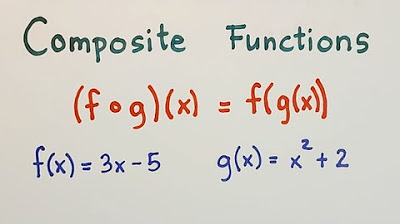A Tale of Three Functions | Intro to Limits Part I
Summary
TLDRThis video explores the concept of limits by comparing three functions: f(x) = x + 1, g(x) = (x^2 - 1)/(x - 1), and h(x), a piecewise function. While f(x) is a simple linear function, g(x) appears similar but is undefined at x = 1 due to division by zero. The piecewise function h(x) equals x + 1 for all x except x = 1, where it is defined as 3. The video illustrates how these functions are almost identical except at specific points, highlighting the subtle differences in their domains and values at x = 1.
Takeaways
- 🔍 The video explores the concept of limits by comparing three functions: f(x), g(x), and h(x).
- 📈 f(x) is defined as a straight line with the formula x + 1 and is graphed accordingly.
- 🔢 g(x) is given by the formula x^2 - 1 / (x - 1), which can be factored to x + 1, but g(x) is not defined at x = 1 due to division by zero.
- 🚫 The graph of g(x) has a hole at x = 1, indicating that the function is undefined at that point.
- 📉 h(x) is a piecewise function with h(1) = 3 and h(x) = x + 1 for all other x values, making it different from f(x) and g(x) at x = 1.
- 📊 The graph of h(x) has a distinct point at x = 1 with a value of 3, unlike f(x) and g(x).
- 🤔 The video emphasizes the importance of understanding the domain of a function and how it can differ between similar-looking functions.
- 🧩 The functions f(x), g(x), and h(x) are mostly the same except at x = 1, highlighting the significance of specific points in function analysis.
- 📋 The script illustrates how to graph functions with special points, such as holes and distinct values, to visualize their behavior.
- 💡 The concept of limits is introduced as a way to understand how functions behave as they approach certain points, even if they are not defined there.
Q & A
What is the main concept discussed in the video?
-The main concept discussed in the video is the idea of a limit, and how it is used to analyze the similarities and differences between three different functions: f(x), g(x), and h(x).
What is the formula for the function f(x)?
-The formula for the function f(x) is f(x) = x + 1.
How is the function g(x) initially defined and what does the instructor suggest to do with such functions?
-The function g(x) is initially defined as g(x) = (x^2 - 1) / (x - 1). The instructor suggests factoring the numerator and checking if there is anything that can be cancelled with the denominator.
What happens when you cancel the common term in g(x)?
-When you cancel the common term (x - 1) from the numerator and the denominator in g(x), you are left with x + 1, which is the same as f(x).
At what value of x does g(x) have a problem?
-g(x) has a problem at x = 1 because it results in division by zero, which is undefined.
How is the graph of g(x) different from f(x)?
-The graph of g(x) is almost the same as f(x), but it has a hole at x = 1 where the function is not defined, represented by a circle with a hole in the graph.
What is the definition of the function h(x)?
-The function h(x) is a piecewise defined function where h(x) = 3 when x = 1, and h(x) = x + 1 for all other values of x.
How does the graph of h(x) differ from the graphs of f(x) and g(x)?
-The graph of h(x) is the same as f(x) for all values except x = 1, where it has a distinct point at (1, 3), which is different from the hole in g(x) and the regular line in f(x).
What is the domain of the function g(x)?
-The domain of g(x) is all real numbers except x = 1, because at x = 1, the function is undefined due to division by zero.
How do the values of f(x), g(x), and h(x) compare at x = 1?
-At x = 1, f(x) = 2, g(x) is undefined, and h(x) = 3.
What is the main takeaway from comparing these three functions?
-The main takeaway is that while f(x), g(x), and h(x) may look similar, they are not identical due to differences in their definitions and behaviors at specific points, particularly at x = 1.
Outlines

Dieser Bereich ist nur für Premium-Benutzer verfügbar. Bitte führen Sie ein Upgrade durch, um auf diesen Abschnitt zuzugreifen.
Upgrade durchführenMindmap

Dieser Bereich ist nur für Premium-Benutzer verfügbar. Bitte führen Sie ein Upgrade durch, um auf diesen Abschnitt zuzugreifen.
Upgrade durchführenKeywords

Dieser Bereich ist nur für Premium-Benutzer verfügbar. Bitte führen Sie ein Upgrade durch, um auf diesen Abschnitt zuzugreifen.
Upgrade durchführenHighlights

Dieser Bereich ist nur für Premium-Benutzer verfügbar. Bitte führen Sie ein Upgrade durch, um auf diesen Abschnitt zuzugreifen.
Upgrade durchführenTranscripts

Dieser Bereich ist nur für Premium-Benutzer verfügbar. Bitte führen Sie ein Upgrade durch, um auf diesen Abschnitt zuzugreifen.
Upgrade durchführenWeitere ähnliche Videos ansehen
5.0 / 5 (0 votes)






